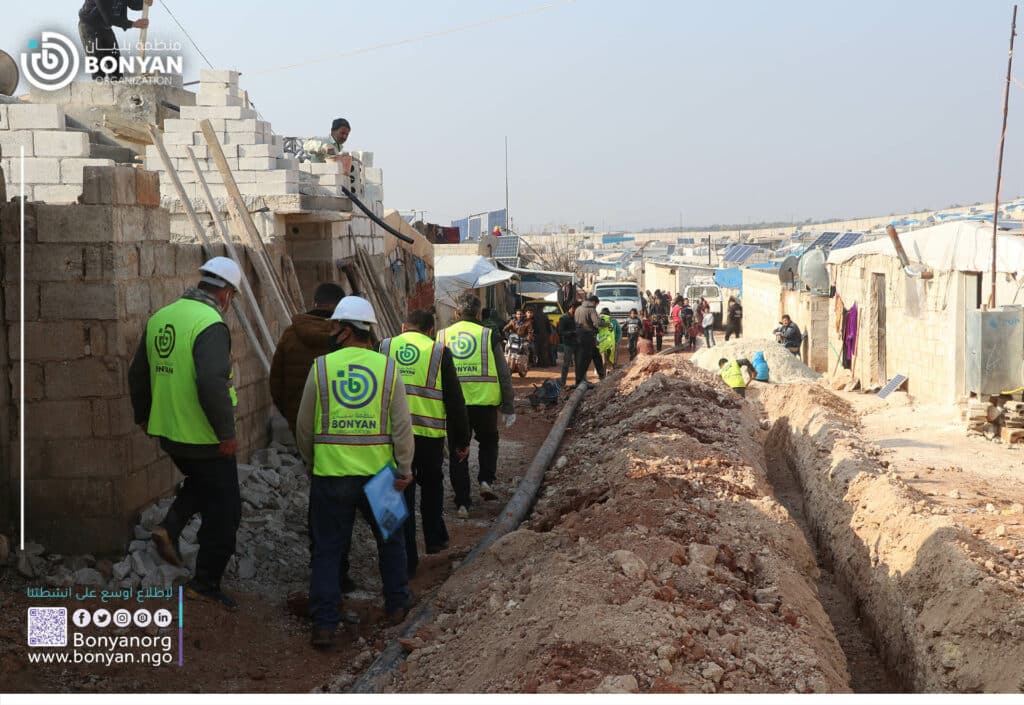Access to clean water is certainly one of the most crucial needs for any community, let alone a community affected by humanitarian crises, such as conflicts, famines, and natural disasters.
Given their critical humanitarian situation, refugee settings are considered among the communities most in need of clean water.
In this article, we pinpoint the strategies and techniques that civil society organizations adopt in order to serve the affected refugee communities.
Emergency Water Supply
There are multiple techniques whereby global organizations, NGOs, and non-profits can supply refugee communities with emergency water supply. These include:
1. Distributing water purification tools: These tools include tablets, filters, and other purification methods, to families in need. They can be utilized to treat contaminated water and make it safe to drink.
2. Installing water tanks: These tanks can collect and store water for use by the local population.
3. Constructing water wells: NGOs can construct water wells in areas affected by an emergency. At Bonyan Organization, we hold campaigns to provide the affected populations in Syria, Yemen, and Gaza with clean drinking water by building wells.
4. Distributing water bottles and jerry cans: NGOs can distribute water bottles and jerry cans to families in need.
5. Delivering water: NGOs can deliver water to refugee families in need of an immediate source of clean drinking water that can help prevent dehydration.
Water Treatment Technologies for Humanitarian Emergencies
There are multiple treatment technologies that civil society organizations can use during humanitarian emergencies, such as in refugee camps. These include the following:
1. Solar disinfection: Solar disinfection is a simple and cost-effective method of treating water using the sun’s power to disinfect it from bacteria.
2. Point-of-use disinfection: Point-of-use disinfection systems are designed to treat water, allowing for the safe use of water sources that may be contaminated.
3. Sand filtration: Sand filtration involves passing water through several layers of sand, a process that removes contaminants as the water passes through.
Hygiene Promotion and Safe Water Storage in Humanitarian Settings
Hygiene promotion and safe water storage in humanitarian refugee settings refer to the strategies and activities used to ensure that people have access to safe and clean water supplies and promote good hygiene practices to prevent the outbreak of diseases.
This involves educating communities about the importance of hygiene practices, providing access to clean water supplies, and ensuring safe water storage to prevent water contamination.

Addressing The Challenges of Providing Water in Humanitarian Emergencies
Civil society organizations face multiple challenges in providing water in refugee humanitarian emergencies. Some of these challenges include the following:
-
- Limited resources, such as lack o funds, personnel, and equipment.
-
- Some challenges have to do with accessing the refugee areas.
-
- Some issues have to do with a lack of coordination with local authorities and other humanitarian organizations.
-
- The quality of the water provided is unsafe to drink.
Addressing these challenges could be done through the following measures:
-
- Ensuring access to clean water sources.
-
- Investing in local infrastructure.
-
- Utilizing innovative technologies.
-
- Raising awareness among the local communities of the risks of unsafe water.
WASH Services in Healthcare Facilities
WASH services are of critical importance in healthcare facilities as they help to reduce the spread of infectious illnesses and develop overall health and well-being.
Poor WASH services can lead to the spread of preventable illnesses, which can be costly for the healthcare facility and for the patients themselves.
Adequate WASH services also help reduce the risk of healthcare-associated infections, as well as provide a safe and clean environment for patients and healthcare workers alike.
WASH services can help improve the overall quality of care in healthcare facilities and are a critical part of providing a safe and healthy environment for both patients and staff.
Bonyan Organization aims to support the crisis-stricken refugee communities with projects that provide them with clean water.
One of the campaigns that we are currently holding is the “Clean Water for ONE Million Refugees – Syria, Yemen, and Gaza” campaign.
By organizing this campaign, we are aiming to provide 1 million refugees with safe water to attend to their various needs, including drinking and cooking, as well as their personal hygiene needs.
You can now join hands with us to help our affected refugee brothers and sisters by donating to the following projects:
-
- Providing villages with the equipment necessary to store water.
-
- Covering the costs of repairing the damaged water facilities.
-
- Building wells.
-
- Transporting water to remote areas.
Donate now at this link: (click here)
Resources
FAQ
How can we improve our access to clean water?
We can improve our access to clean water by the following measures:
Investing in better water infrastructure.
Establishing water-conservation initiatives.
Improving sanitation systems.
Educating communities on the importance of clean water.
Why is access to clean water so critical for human health?
Clean water is critical for human health because it is necessary for drinking, cooking, and personal sanitation.
How can we help provide clean water for developing countries?
We can help provide clean water for developing countries through:
Advocating for better access to clean water.
Donating money to help fund clean water projects.
Using water responsibly and limiting its usage.
What actions are most urgent in relation to water sanitation and health?
The actions most urgent in relation to water sanitation and health are:
Providing access to safe drinking water and proper sanitation facilities.
Improving hygiene education and practices.
Investing in water infrastructure and maintenance.



